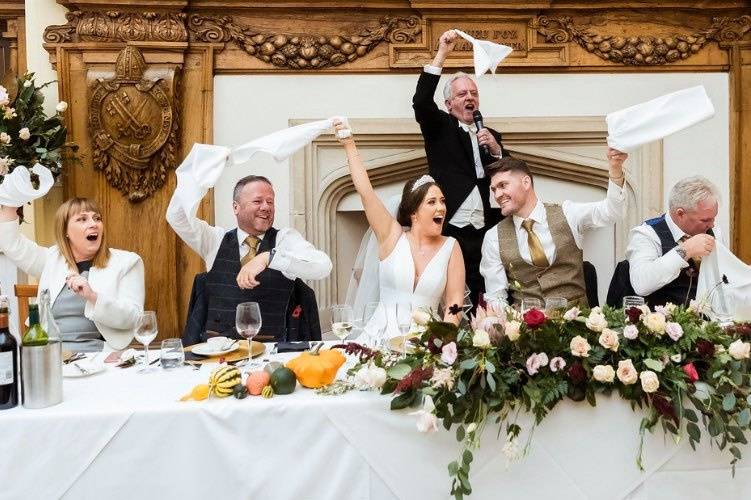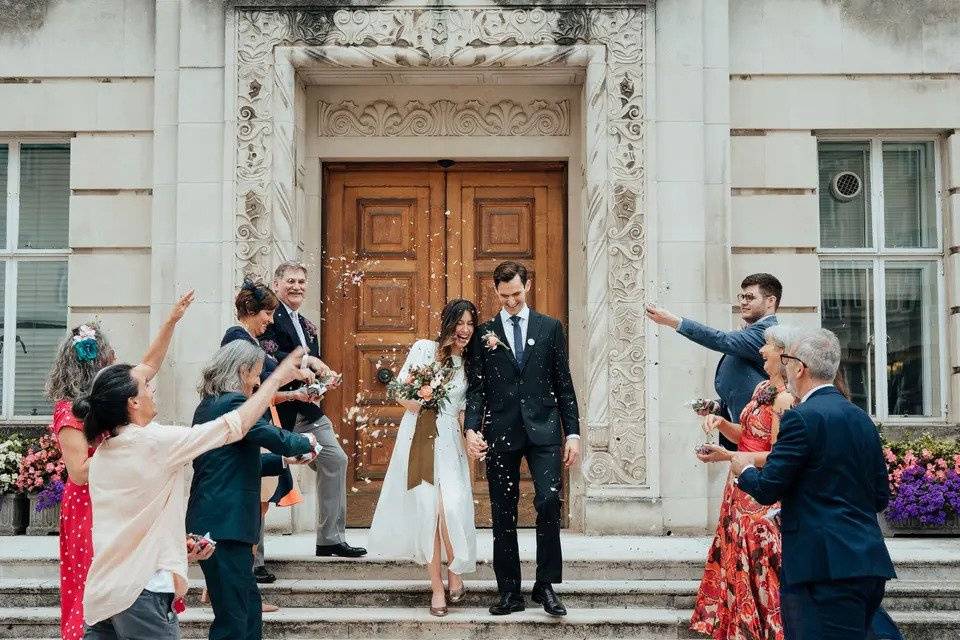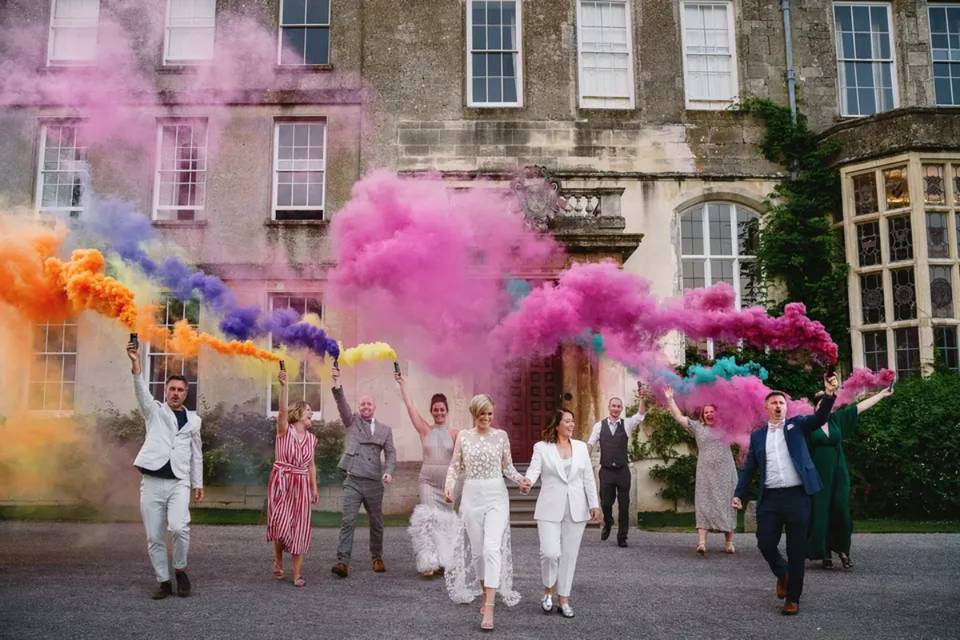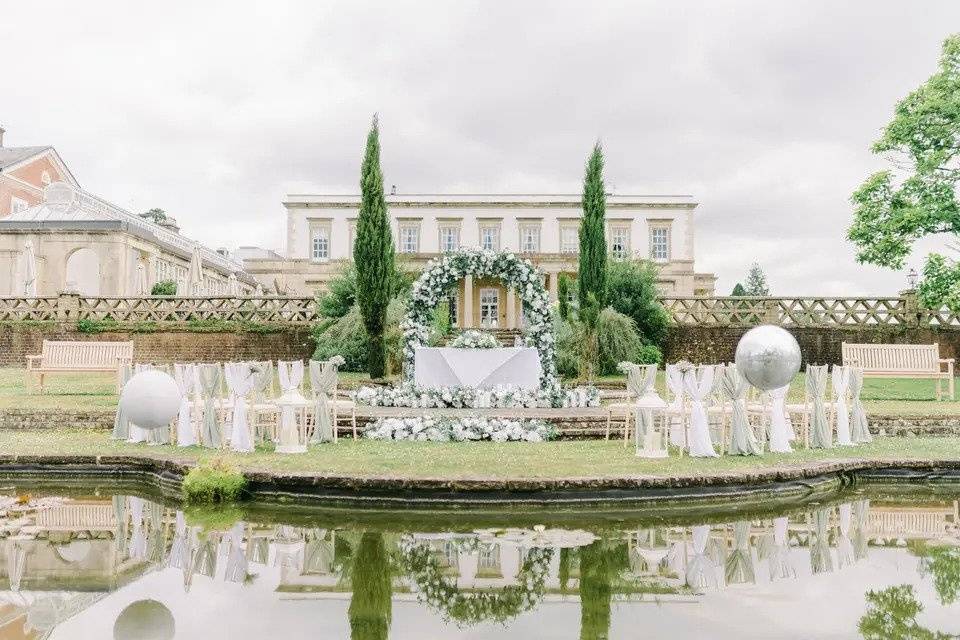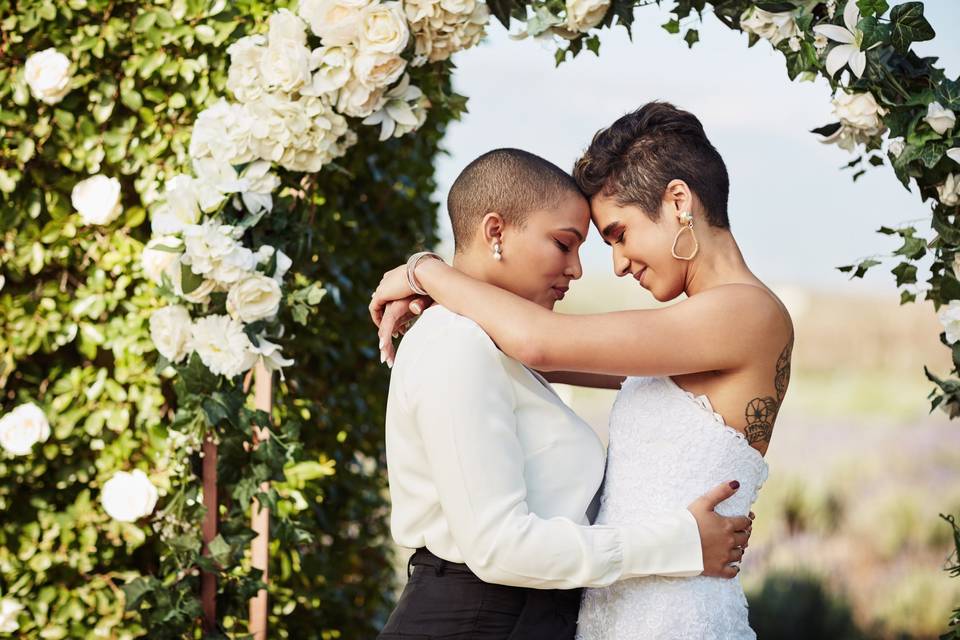Planning a Civil Ceremony: Your Ultimate Guide
Ready to get legally wed? We explain everything you need to know to arrange a civil wedding ceremony in the UK, from venues to costs - and what actually happens on the day
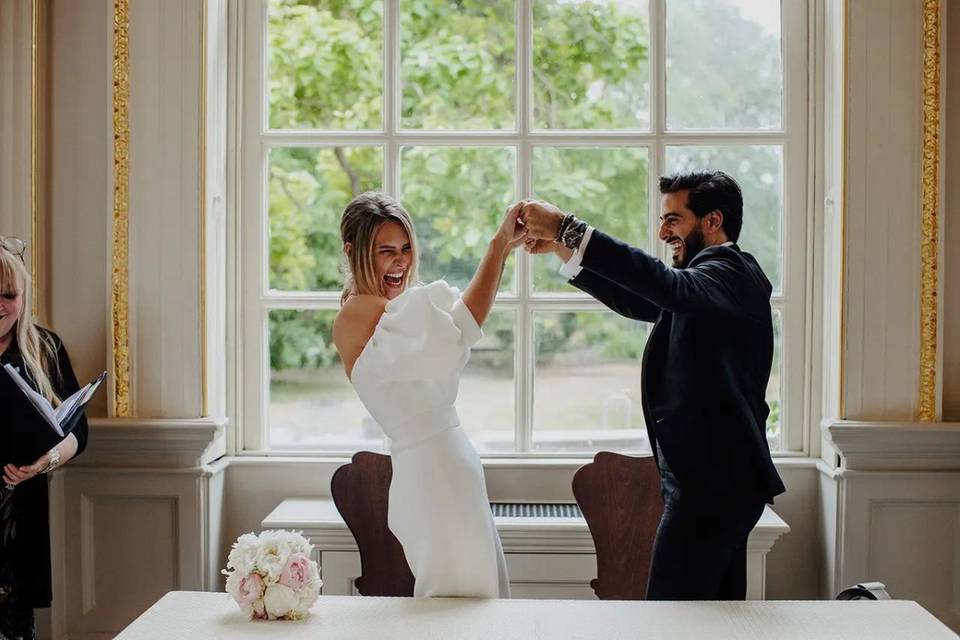
You're engaged! Congratulations - now it's time to start thinking about your wedding, and what kind of ceremony you'll have: a civil ceremony, religious or symbolic.
Forget the idea that a civil ceremony is plain vanilla! Civil marriages in the UK are becoming increasingly popular, and for good reason. They offer flexibility to create a celebration that's true to you, whilst also making your marriage legally recognised and binding at the same time.
A civil wedding ceremony offers the freedom to personalise parts of your ceremony, from the wedding vows you exchange to the wedding ceremony music you play. There will be some words you have to say in order for the ceremony to be legally binding, but many registrars will allow for you to read your own vows and have readings too.
Whether you envision an intimate gathering in a cosy venue or a larger affair in a stunning location, the possibilities are endless. So, embrace the opportunity to design a civil ceremony that perfectly captures your love story and leaves a lasting impression on you and your guests.
Everything You Need To Know Before Planning Your Civil Ceremony
Planning a civil wedding ceremony might seem a bit complicated at first, but we're here to break it down for you. There are still several important requirements to consider before you say "I do."
Whether you want to make it unique or keep things simple, the steps for arranging your civil wedding are the same for both. Excited to get started? We've got you covered, so grab your wedding journal and let’s get planning!
What Is a Civil Wedding Ceremony in the UK?
Civil ceremonies are a popular choice for couples tying the knot. Performed by a government official called a registrar, these ceremonies are legally binding but don't include religious elements.
For many couples, a civil ceremony serves as the main event of their wedding celebration, offering the opportunity to personalise the proceedings with meaningful readings, music selections, and decorative elements.
Others may opt for a combination of a civil ceremony, primarily for legal purposes, and a separate religious ceremony or non-religious blessing to honour their spiritual beliefs or cultural traditions.
Additionally, for those planning a destination wedding abroad, arranging a civil ceremony at home beforehand may be necessary to ensure legal recognition of the marriage in their chosen location.
In the UK, you're required to give notice of your intention to marry at least 28 days before the ceremony. This legal step ensures everything is above board and your marriage is properly recognised. While giving notice might sound straightforward, the process itself can sometimes involve additional steps - don't worry, we’ll go through all of this further down!
Here's the golden rule: when choosing your wedding date, factor in at least six weeks from the day you'd like to get married. This buffer period accounts for the 28-day notice period and any additional time it might take to complete the formal notification process.
What Can I Expect at a Civil Wedding Ceremony?
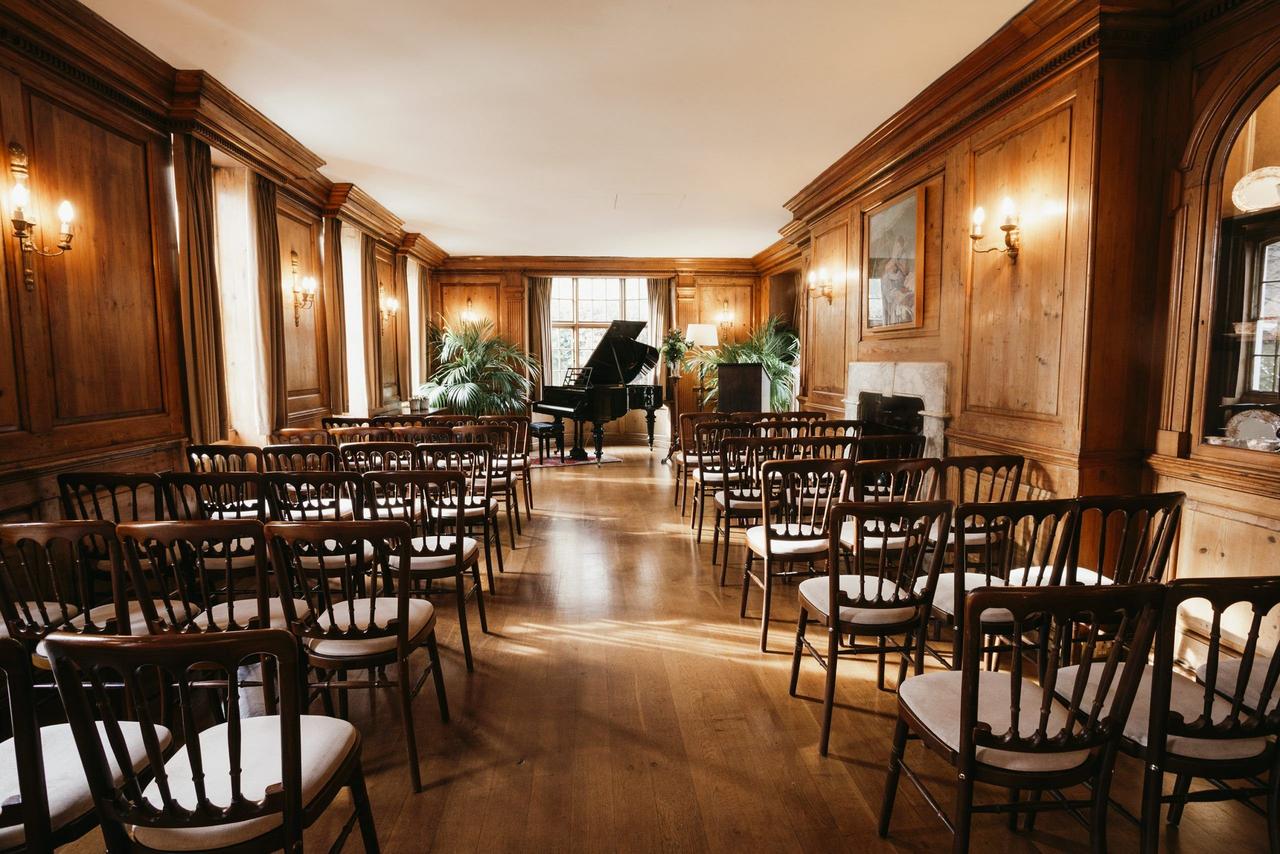
During the ceremony, which is typically led by a registrar, you can expect a warm and intimate atmosphere that lasts around 20-30 minutes. This special moment will include the exchange of legal vows and the signing of the marriage register, marking the official start of your journey together.
What makes civil ceremonies truly special is the opportunity to personalise every aspect to reflect your unique love story. From selecting wedding readings that resonate with you to choosing music that sets the perfect mood, and even crafting your own vows (as long as they're not religious), you have the freedom to add details to suit your preferences.
Before the ceremony takes place, you will have a pre-marriage meeting (separately) with the registrar to ensure all details for the marriage certificate are confirmed. This meeting provides a chance to go over any final arrangements and address any questions or concerns you may have, helping to ensure that everything runs smoothly on your big day.
How Do I Find a Civil Ceremony Venue?
Remember when we talked about ‘giving notice’ earlier? Well, in the UK you need to know exactly where you're getting married in order to give notice, so finding a suitable venue will be your first step.
In England and Wales, civil ceremonies can only take place at venues that have been approved to host civil marriages. The great thing is, there are plenty of unique wedding venues to choose from. From charming country houses and rustic barns to elegant hotels and cosy restaurants, there is something to suit every couple's style.
If you and your partner have your hearts set on a reception venue that isn't licensed for ceremonies - don't worry! You can still celebrate your special day at your dream location, just register your marriage (aka, do the legal ceremony bit) beforehand (or after) at your local registry office.
It's a quick and simple process that gets the legal stuff out of the way. Then, head straight to your dream reception venue and kick off the real party! Your guests won't even know the difference – they'll just be thrilled to celebrate with you in such a beautiful setting.
For those planning a civil ceremony in Scotland, Northern Ireland and the Channel Islands, lucky you! You can get married pretty much anywhere, just make sure you have the agreement of the officiant.
Do You Book the Registrar Before the Venue?
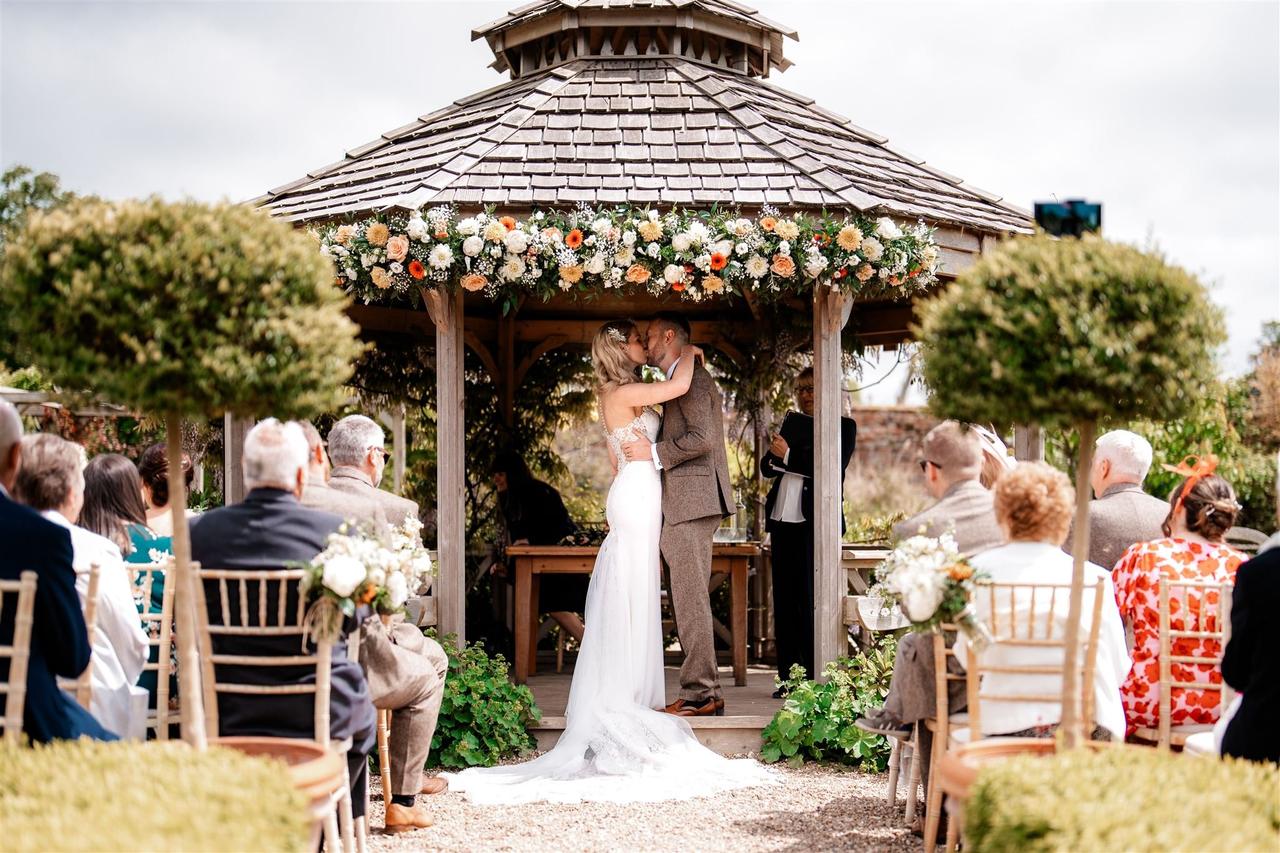
You need to book your wedding venue first, then registrar second. Finding the ideal venue where you'll say "I do" is your first priority. Once you have this locked in, then start booking your register. Many venues are happy to help with this process, but you will need to contact the registry office closest to your chosen wedding location (but you give notice as the registry office closest to where you live!).
In a UK civil ceremony, the registrar acts as the official celebrant. They conduct the ceremony, ensure legal compliance by witnessing vows and ring exchange, and register the marriage, making it official. The fee for a registrar varies based on whether you're tying the knot at a registry office or opting for a different venue such as a hotel, country house, or outdoor setting, so make sure you factor this into your wedding budget.
What's Involved in Giving Notice?
With your dream venue secured, it's time to make things official! Giving notice is the next step to ensure your UK civil ceremony is legally recognised.
Head to your local registry office, the place where you'll declare your intention to marry. If you and your partner live in different places, you’ll will each need to give notice separately in the register offices where you both live (but aim for the same timeframe!).
Remember, you need to give notice at least 28 days before your wedding date, so factor this in while planning. Make sure you've lived at your current address for at least seven days beforehand. Contact your local registry office to schedule an appointment and pay the fee (around £35 per person). During your appointment, you'll provide details about your chosen venue - please note, if you change your venue, you will have to begin your notice period again.
You can browse our guide to giving notice here.
What Documents Do I Need to Give Notice?
When you go to the registry office, you need to take:
- Proof of your name, age and nationality. This could be a valid passport, birth certificate, national identity card from the EEA or Switzerland (if non-British), certificate of registration, certificate of neutralisation, biometric residence card or permit or a travel document.
- If you’ve changed your name, you must also bring proof of that, for example a deed poll.
- Proof of address, for example a valid UK or EEA driving licence, gas or electricity bill from the last 3 months, a bank statement from the last month, or a council tax bill or mortgage settlement from the last 12 months.
- If you’ve been divorced or widowed, you will need to bring the decree absolute or final order, or the death certificate of your former spouse.
Different rules apply to anyone from outside the European Economic Area or Switzerland, so check here for more information. If your partner isn’t from the UK, Switzerland or the EEA and isn’t settled in the UK, they will need to apply for a Marriage or Civil Partnership Visitor visa.
It's best to confirm with your local registry office what exactly they will require from you before you go - for example, some may specifically require a photographic form of ID.
What Décor Can I Have at a Civil Wedding Ceremony?
Transforming your civil ceremony space into your dream backdrop is such an exciting part of the planning process. But the level of personalisation you can achieve depends on your chosen venue.
If you and your partner have opted for a registry office, we recommend checking with them in advance about their policies on flowers and other decorations, as some may have limitations due to time constraints or existing décor.
If you're holding your ceremony at a different venue, like a barn wedding venue, hotel, or even outdoors, you usually have more freedom to personalise the space. Think of it as a blank canvas waiting for your creative touch! Depending on the venue, you can still create a wedding aisle and a grand bridal entrance if you desire.
Either way, to really enhance your civil ceremony with romantic touches opt for things like a custom aisle runner or petal scatter. You can complement this by adding lanterns and candles for a warm ambiance.
Another great way to adorn your space is to add stunning flower arrangements or captivating floral arch. You may also want to incorporate indoor trees or greenery for a fresh feel, and welcome guests with a personalised sign for a final touch.
Hitched Tip: Make your floral budget go further by repurposing your ceremony arrangements for the reception décor.
How Can I Personalise a Civil Wedding Ceremony?
Your civil ceremony is more than just the legalities – it's a chance to celebrate you and your partner's love story in a way that reflects your personalities. While standard vows are usually provided, the beauty of civil ceremonies lies in the ability to personalise them.
Beyond the traditional vows that are required, you can often add your own heartfelt messages. This could be a funny anecdote about how you met, a special inside joke, or a heartfelt promise you want to make to each other. This is your chance to express your love in a way that's uniquely you!
Music is also a powerful tool for creating the atmosphere you want. Choose songs that hold special meaning for you as a couple, perhaps a song from your first dance or a piece that reflects the emotions of the ceremony. Just remember to check with the registrar beforehand to ensure your chosen music doesn't have religious connotations as this isn't permitted.
Finally, adding readings performed by friends or family members is a lovely way to personalise the ceremony. These readings could be poems, song lyrics, or even excerpts from your favourite books. Choose something that resonates with your relationship and adds a touch of sentimentality to the occasion.
What Do I Wear to a Civil Wedding Ceremony?
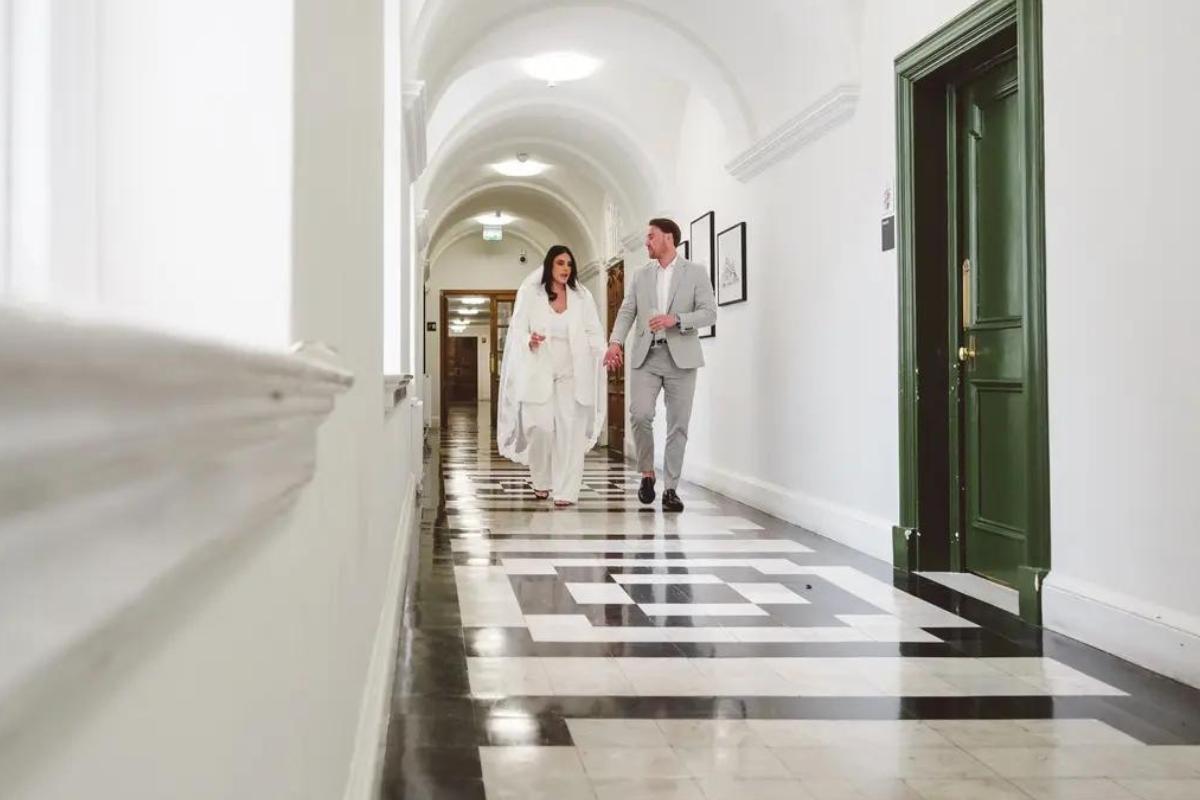
Unlike traditional weddings with stricter dress codes, civil ceremonies allow for more relaxed and personalised choices. The key here is to choose an outfit that is going to complement the overall mood you're setting for the day.
If you are planning an elegant affair, you should embrace that vision and opt for a stunning gown or a tailored suit paired with elegant accessories to create a sophisticated atmosphere. If a relaxed and intimate ceremony is more your style, you can absolutely rock a stylish yet comfortable outfit. Think flowy jumpsuits, cocktail dresses, or tailored separates.
There are really no hard and fast rules when it comes to civil ceremony attire. The most important thing is to choose an outfit that makes you feel confident and beautiful.
Need a little style inspo for your big day? We've put together a collection of gorgeous registry office wedding dresses to help you find the perfect look for saying "I do"!

